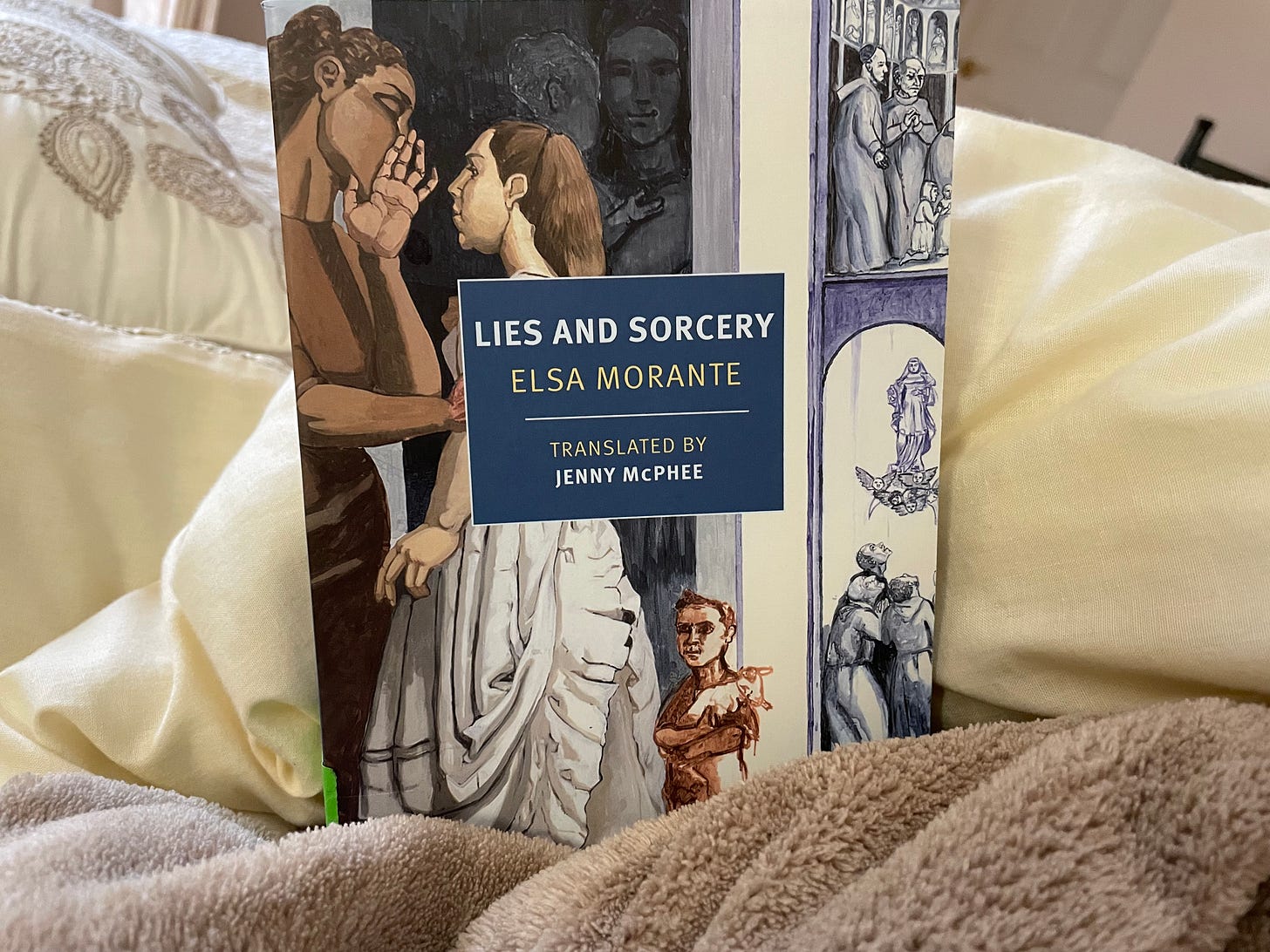FEVER, LIES AND SORCERY
For the last several weeks details about the English translation of Elsa Morante's epic work had been assailing me in different ways. The translation of this magnum opus is simply luminoso!
This past Monday I saw the late Elsa Morante’s Lies And Sorcery lying on my tsundoku shelf begging to be opened. Later that evening, however, a scratchy throat presented itself, but already having savored the brilliant first pages of what is proving to be such a tangled tale about three generations of a family from Italy, I wasn’t been able to stop reading at my feverish pace. There I was, off on a horse carriage, into a world where handsome, affluent men serenaded girls from below their windows and told them convoluted lies about how much they loved them when they loved only themselves, their cravats and their privileged lives.
Bringing the vanities of the Belle Epoque is Elsa Morante (1912–1985), an Italian novelist, poet, and translator; in the last many weeks, her name has returned to me several times in connection with Elena Ferrante, the author of the Neapolitan quartet. Morante, who lived in Rome, published her first collection of stories in 1941 and was awarded both the Viareggio Prize and the Strega Prize for her work.
In a recent New Yorker story, writer Jess Bergman notes how in Lies And Sorcery, Ferrante saw how a writer could prioritize women’s feelings and issues in a story that dealt mostly with women. “What she seemed to take from Morante was permission: to write about women, ambitiously and at great length, without apology or fear of ugliness. It isn’t hard to find traces of her predecessor in the Neapolitan quartet,” Bergman writes. The women in Morante’s work—at least in the first three-hundred pages—are either venomous termagants or sniveling helpless waifs. How did these women become who they are? What evolutionary processes made them the human beings they became?. I have another question, one that has come up in my family with respect to the way family members often resort to repetitive, destructive behavior. What does it take to break a destructive pattern?
Just like the ugly flu that I’ve battled this entire week would not let go of my innards, Lies And Sorcery, too, put me in an altered state. Whenever I had a reprieve—thank god for Tylenol and Ibuprofen that gave me hours of clarity and purpose—I dipped into Morante’s voluminous 750-page tome again. I’m not even halfway through the book but its masterful pacing and its scorching assays into human character have ensnared me. I will return to it next week, too, to wrap up how I felt about the work.
The tale begins in the mid-1940s in Sicily. The first-person narrator, at least at the outset, seems to be a young guileless woman named Elisa who has been in isolation in the home of her guardian, Rosaria, a prostitute who had loved her father.
Two months have passed since the death of my adoptive mother, my guardian, my only friend. I was orphaned as a young girl (over fifteen years ago), and she took me in, adopted me, and gave me a home with her.
One paragraph of the introduction seems to set the stage for this book’s searing focus on the making—and the unmaking—of a woman.
“I look at the frail, nervous person bundled up in her usual maroon dress (I haven’t bothered to wear black), her unkempt ebony braids piled high on her head in the old-fashioned style, her face wan, her skin dark, her eyes big and bright, anticipating , as is her wont, the appearance of ghosts, the casting of spells. And I ask myself, “Who is this woman? Who is this Elisa?” Often, as I used to do as a child, I turn away form the mirror hoping that when I turn back I will see an entirely different self. My second mother was the only person who ever praised me or saw me as beautiful. Since her death, my old erosion to my body has returned and intensifies by the day.”
The word “erosion” did indeed occur to me several times as I was reading the book. In each part of Lies And Sorcery, we hover over the lives of women who have been gypped by cads who unequivocally changed the temperaments of those they sought to seduce. In life, there is this notion of nature versus nurture in the development and evolution of a human being. Through the laborious evidence offered in Lies And Sorcery, we learn that there’s another component, a third one, that I’ll label pernicious manipulation. In the story, it manifests as an endless ablation of hope and optimism in one human heart owing to the guile and malevolence of another, thus changing the victim into one toxic sludge of organic matter.
Told by Elisa, orphaned young and raised by a “fallen woman”, the tale of the Massia family begins with a family scene in which Elisa’s grandmother Cesira sits “like a sphinx” in a corner of the kitchen, “living among them like an intruder and a parasite.” Naturally, with a sense of urgency that will never really leave any reader who picks up this book, we want to know exactly how this mother and a daughter could have devolved to this specific abhorrent moment in their lives. Cesira’s beautiful daughter Anna is seething and the two women are at loggerheads again.
“Keep in mind that you own nothing, not even the air that you breathe, and that even the tiniest morsel that you eat is thanks to the generosity of others!” At this, my grandmother stood up from the chair, and, with a menacing grin, shook her head vehemently. “I curse you,” she told my mother, her voice agonized and shrill. “Remember that your own mother is cursing you. Listen, God, I curse her,” and overcome by desolate sobs, she furiously beat her head with her fists. In tears, I cried “Nonna, Nonna.” My mother stood up, glared at me with glistening eyes, then angrily shook me by the arms.
For years Elisa has lived in an imaginary world of her own, cut away from the social life and the goings-on in the rooms of the brothel in which she lives. Now, however, her guardian has died, and the young woman feels that she must abandon her fantasy life to confront the truth of her family’s fractious past. We realize even as Elisa’s story begins, that she, too, may be as much of a con artist as all the forebears in her ancestry to whom she owes her birth.
Cesira is the only one of three sisters who receives an education and she aspires to a larger life in the city where she meets a dandy, Teodoro Massia, the depraved younger son of an aristocratic family. Teodora has long been booted out of the family. Cesira does not learn this until after they return from their honeymoon. Out of the brief union of Cesira and Teodoro comes the gorgeous Anna who has inherited the spellbinding beauty of the Massia family. Cheated of her life of comfort, Cesira begins to loathe and resent her husband for the rest of their lives long after she has a beautiful child through him. The monumental halt in her social aspirations is given voice in a passage in which Cesira,, knowing that her husband is back to fraternizing with hoodlums, resorts to wandering through the bougie parts of town with Anna in order to satisfy her craving for upward mobility.
Like Eve before the closed gates to the Garden of Eden, Cesira stopped now and again before a shopwindow. Her desire for those forbidden ornaments tormented her and she imagined smashing the windows, stealing the precious merchandise, then, heavy with the booty and laughing and screaming like a harpy, she would throw herself into one of the carriages and beg “Help me.”
Unfortunately, the story of the daughter Anna is as disquieting as that of Cesira. One day in her teens Anna meets her cousin, Edoardo, the handsome, evil-tempered son of Teodoro’s rich sister, Concetta. She falls passionately in love with him and slowly succumbs to both his good looks and his con.
In this first half, one thing is clear. No one is vile in every regard. Conman Teodore Massia cheated Cesira of her dreams pretending to be a wealthy count but he is remorseful and desperate by the time he hobbles to his death. He will do anything to ensure that Anna can make her claim to the Massia fortune. Cesira never forgave her husband but when he passes on, she is a puddle of tears and mired in sorrow, to the consternation of Anna who cannot believe the hypocrisy behind it all. Lies And Sorcery is a deep, episodic study of the many shades of human character.
While reading books in translation every week, I’ve been finding connections that address a million feelings traversing through my body. When I was reading Lies And Sorcery, the green-eyed monster that visited many of the characters of the novel visited me too.
The effortless of craft shows as much in translation as it does in any original work, From the get-go, Jenny McPhee’s sentences were polished and precise. Her talent—and last name—piqued my curiosity. Could she be related to THE one and only John McPhee, my guru from the world of nonfiction? I found my answer within seconds. Of course she was! It turns out that the translator of this brilliant book is also the author of the novels The Center of Things, No Ordinary Matter, and A Man of No Moon. She is the director for the Center of Applied Liberal Arts at New York University and she is a recipient of the Guggenheim Fellowship.
During a week sacrificed at the altar of fever and fatigue, this tortuous journey into the minds of toxic people probably exacerbated the chills. The manipulation, the gaslighting, the vanities, the extent to which chicanery and toxicity can alter the workings of another mind, were all discombulating and heartrending. They made this work pulsate with energy, rendering a very fat book suddenly both nimble and thin.







Sounds like a heavy read…Loved the way you ended. The last paragraph spoke volumes
You’re the Iron Woman of reading, delving into a novel that made your flu symptoms worse! No comfort-book-on-the-couch for Kalpana! Though if I were a novelist, I’d wonder about having my book compared with an infectious disease. Hey, if the flu fits...